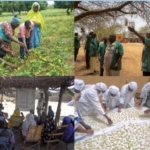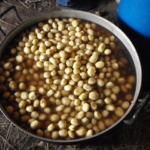


Institut National de la Recherche Agronomique du Niger
AMSP & IRSAT
Burkina Faso Niger
11/2014—11/2018
Sorghum and pearl millet are major staples for smallholder farm families in West Africa where malnutrition is common. Local cereal fortification with indigenous legumes (cowpea, groundnut, Bambara groundnut), which are generally richer in protein, minerals and vitamins (e.g., iron, zinc, vitamins A and D), can be a means to remediate micronutrient deficiencies in common diets. This project builds on previous work conducted by the team in cooperation with rural and urban processing units owned by women.This project strengthens local cereal and legume processing and diversify uses of local grains. Furthermore, outcomes will contribute to improved local value chain development, income generation for women, and a reduction of malnutrition. By combining diverse cereals and legumes in the processing, this project indirectly promotes legume integration in cereal-based systems and this contributes to agroecological intensification, a priority area of CCRP. Value chain development is expected to lead to income generation opportunities, especially for women both in rural and urban areas. By considering micro- and macro-nutrient content of processed products, the project can be considered as nutrition-informed and contributing to reduction of malnutrition.
By combining cereals and legumes in food processing, this project indirectly promotes legume integration in cereal-based systems. This in turn contributes to agroecological intensification, which is a priority area of CCRP. By identifying different varieties for different uses (exploiting option-by-context interaction in the processing), the cultivated varietal diversity can be promoted, which is another pillar of sustainable and resilient production systems. The value chain development is expected to lead to income generation opportunities for women both in rural and urban areas. The project has a strong focus on women’s empowerment, as women are the main actors in the food processing activities. Furthermore, by considering micro- and macro-nutrient content of processed products, the project can be considered as nutrition- informed. This is very important as severe child malnutrition is widespread in both rural and urban areas of Niger and Burkina Faso. The project has also a good capacity building component in cooperation with Purdue University; including training of one PhD candidate from Niger.
Expected outcomes of this project include:

